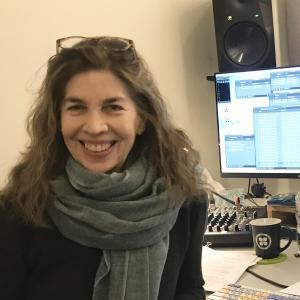Bernice Schneider is an award-winning documentary film editor who trained as a filmmaker at MIT’s Media Lab, under the direction of Richard Leacock. She has worked as an editor of independent and broadcast documentary films for over 25 years. She enjoys the collaborative process, and the ability to problem-solve creatively with producers, directors, and composers.
She brings an innate feeling for storytelling to the films she works on, with a particular focus on structure, and focusing on seeing the personal side of the material, bringing viewers close to the characters and subject matter.
She has edited numerous films for PBS’s premiere television series American Experience, Frontline, Nova, and American Masters. Among the award-winning films she edited is Lives Worth Living about the disabilities rights movement told from the perspective of its heroes and their dramatic battle for the passage of the Americans with Disabilities Act, one of the most important pieces of civil rights legislation in American history. The film was selected for the U.S. Department of State’s American Film Showcase. She also edited The House We Live In, Race: The Power of an Illusion, a groundbreaking series that continues to be included in curricula in many schools and universities; Rebel, an intriguing portrait of a woman, a myth and the politics of national memory. Rebel won the Eric Barnouw Honorable Mention Award as the best historical film in America, premiered at Frameline Film Festival, and toured theatres and universities across the country; and Douglas MacArthur: Destiny and The Politics of War broadcast on American Experience and winner of a Prime Time Emmy.
Bernice Schneider’s other awards include The Telly Award for the best Public interest/awareness film for the documentary Blood Sugar Rising. This film explores the history and science of diabetes through portraits and voices that challenge viewers to look at the diverse environments where we live. The film illustrates how social inequities in communities of color and in poor areas contribute to this hidden national crisis. This two-hour film also explores new hopes for the discovery of safer, more effective medical treatments for this devastating ailment.
Ms. Schneider has also worked in South Africa, Haiti, and Somalia with national correspondent Charlayne Hunter-Gault for PBS’s Newshour for which she edited a series of long-format stories that won the Harry Chapin Media Award for outstanding films that positively impact the critical issues of hunger, poverty, and self-reliance.
The films she has edited have screened at museums both nationally and internationally, including the Museum of Modern Art, the Centre Georges Pompidou, the Corcoran Gallery, the Museum of Fine Arts, and the Folkwand Museum in Essen, Germany.
She has received numerous honors and awards for her personal work, including a Wallis Annenberg Scholarship for Women Filmmakers; N.E.A. Regional Fellowships; CINE Golden Eagles; the Eric Barnouw Award; Biographical Film Award; Directors Choice Award; Silver Apple; International Biennale of Films on Art, Centre Georges Pompidou.
Several films she edited have been added to the permanent collections of the Museum of Modern Art, and The Library of Congress.
Bernice has also served as a mentor for emerging filmmakers through ARC (Artist Retreat Center) NALIP, an arts residency for women filmmakers of color. She is currently working on various film projects, advises and consults on documentaries, and teaches editing at Emerson College in Boston.
About
- Department School of Film, Television, and Media Arts
- Since 2016
-
Office Hours
- Tuesdays: 2:00-3:00 p.m.
Education
M.S., Massachusetts Institute of Technology
Areas of Expertise
- Editing
